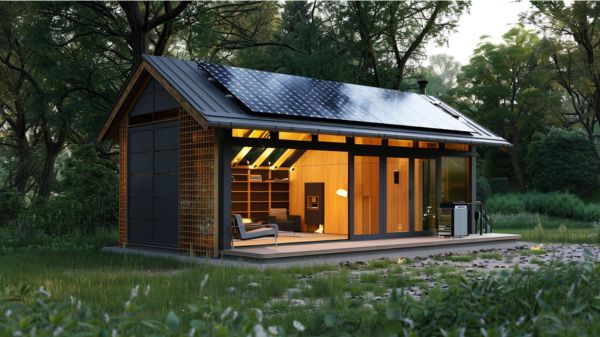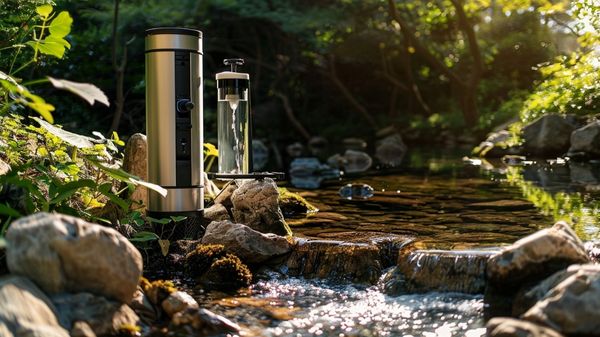Exploring cost-effective energy storage solutions for off-grid living is vital for sustainable and reliable power access. The advancements in lithium-ion batteries, flow batteries, hydrogen fuel cells, flywheels, and thermal energy storage present intriguing possibilities for those seeking independence from traditional grid systems.
These innovative technologies not only promise efficiency but also offer a glimpse into the future of energy sustainability. Embracing these solutions could revolutionize off-grid living, ensuring a steady power supply while minimizing environmental impact and operational costs.
Key Takeaways
- Lithium battery storage offers superior energy density and extended lifespan for cost-effective off-grid living.
- Efficient solar power banks provide sustainable energy storage with multiple device charges in a compact design.
- Compact hydroelectric storage systems harness flowing water sources, offering reliable and eco-friendly energy solutions for remote locations.
- Budget-friendly wind turbine storage maximizes electricity generation, making it a cost-effective off-grid solution for sustainable power.
Affordable Lithium Battery Storage
Lithium battery storage solutions present a compelling option for off-grid living due to their superior energy density, extended lifespan, and efficient performance compared to traditional lead-acid batteries. While the initial cost may raise some eyebrows, these batteries prove to be a cost-effective choice in the long run.
Their higher energy density allows for more power in a smaller, lightweight, and compact package, making them ideal for off-grid applications where space is limited. Additionally, their ability to be discharged to lower levels without damage maximizes their capacity and efficiency, ensuring that you get the most out of your energy storage system.
In the world of off-grid living, lithium batteries shine bright as a reliable and efficient power source.
Related Post: Discover 3 Best Batteries For An Off-Grid Energy System.
Efficient Solar Power Banks
When considering portable energy storage solutions for off-grid living, efficient solar power banks emerge as versatile devices that offer sustainable charging capabilities for small electronics. These portable gadgets harness the power of sunlight to recharge, making them ideal for on-the-go energy needs.
Here are some key characteristics of efficient solar power banks:
- Provide sustainable energy storage
- Enable multiple device charges
- Lightweight and compact for easy carrying
- Utilize sunlight for recharging
- Offer convenience with multiple charging ports
Efficient solar power banks not only keep your devices powered up but also contribute to reducing your carbon footprint while keeping you connected in remote locations.
⚡ Stay Powered When the Grid Goes Down
What if you could keep lights, devices, and even critical systems running during any blackout? That’s exactly what Dark Reset shows you how to do—using simple, proven methods. Discover lots of ways to prepare for energy independence.
Compact Hydroelectric Storage Systems
Have you considered the benefits of integrating compact hydroelectric storage systems into your off-grid living setup? These systems harness the power of flowing water sources using small-scale turbines, providing a reliable and efficient energy solution for off-grid living.
By installing compact hydroelectric systems in rivers, streams, or canals, you can enjoy eco-friendly and sustainable energy production, ensuring continuous power in remote locations. Their compact design makes them ideal for off-grid living scenarios where traditional power sources are unavailable.
Embracing compact hydroelectric storage systems not only contributes to a greener environment but also offers a dependable and cost-effective way to meet your energy needs off the grid.
Budget-Friendly Wind Turbine Storage
Exploring budget-friendly wind turbine storage options presents an efficient and sustainable energy solution for off-grid living, complementing the benefits of compact hydroelectric systems previously discussed. When considering wind turbines for off-grid energy storage, several key points should be taken into account:
- Cost-Effectiveness: Wind turbines offer a cost-effective solution, with prices ranging from $3000 to $5000 per kilowatt.
- Global Wind Capacity: The global wind capacity hit 744 gigawatts in 2020, emphasizing the popularity and efficiency of wind energy solutions.
- Strategic Placement: Optimal performance of wind turbines relies on strategic placement, considering factors like wind speed and obstruction-free locations.
- Supplier Recommendation: Solar Direct provides budget-friendly residential wind turbines, catering to off-grid energy needs.
- Efficiency: Properly positioned wind turbines can maximize electricity generation for off-grid applications.
Portable Biomass Energy Units
Portable biomass energy units, utilizing organic materials like wood chips, sawdust, or pellets, offer a sustainable and environmentally friendly solution for generating electricity in off-grid locations. These renewable biomass energy units are portable and can be easily transported to remote areas where traditional power sources are unavailable.
By harnessing organic materials for electricity generation, these units provide a cost-effective alternative to fossil fuels, reducing the environmental impact of energy production. In addition to being sustainable, biomass energy units can serve as a reliable source of power for heating, cooking, and other essential needs in off-grid living situations.
Embracing portable biomass energy units not only promotes a greener lifestyle but also guarantees energy independence in remote locations.
Frequently Asked Questions
What Is the Cheapest Form of Energy Storage?
The cheapest form of energy storage varies based on factors like energy storage capacity, lifespan, and efficiency. Battery banks, pumped hydro, flywheel energy, compressed air, molten salt, capacitor storage, superconducting magnets, gravity storage, liquid air, and thermal storage are options to contemplate.
What Is the Best Power Source for off Grid Living?
Wind turbines, hydroelectric dams, geothermal energy, biomass power, and fuel cells are viable power sources for off-grid living. Integrating these with battery banks, propane tanks, flywheels, and compressed air systems can enhance energy reliability and sustainability.
What Is the Most Cost Effective Energy Storage System?
When considering the most cost-effective energy storage system, factors such as lifespan, efficiency, and maintenance costs play a significant role. Among the options are lithium batteries, pumped hydro, flywheel technology, compressed air, thermal storage, redox flow, capacitor banks, gravity storage, supercapacitors, and molten salt.
What Is the Cheapest Way to Store Solar Power?
When considering the cheapest way to store solar power, options such as DIY battery systems, pumped hydro, compressed air, flywheel energy storage, molten salt tanks, ice storage, gravity systems, hydrogen fuel cells, thermal storage, and capacitor banks can offer varying costs and efficiencies.
Conclusion
To sum up, these cost-effective energy storage solutions provide reliable power supply and reduce dependence on traditional sources for off-grid living. From lithium batteries to solar power banks, hydroelectric systems, wind turbine storage, and portable biomass units, these options offer sustainability and long-term cost savings. By implementing these innovative solutions, off-grid living can achieve energy independence while contributing to environmental conservation.
⚡ EMERGENCY READINESS⚡
Explore a DIY Power Project for Grid-Down Scenarios
Interested in alternative-energy builds? The Hendershot Power Generator program shares a historical DIY concept and easy plans for a hands-on project—great for preparedness hobbyists and energy experimenters.




